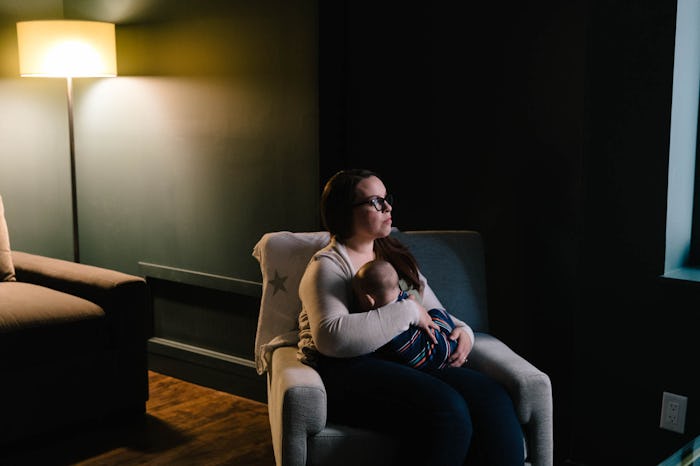Life
Here Are 5 Reasons Why Sex May Still Hurt 6 Months Postpartum
Painful sex after childbirth isn't something you should have to put up with. Luckily, most causes of dyspareunia — or uncomfortable intercourse — are treatable. By six weeks postpartum, a majority of women heal enough to have sex comfortably, but some deal with lingering pain for months, or even years, after that. But if sex still hurts six months postpartum, here are some reasons why and how a doctor can help you get things back on track.
As WebMD reported, an Australian study showed in 2015 that a quarter of women still experienced pain during sex 18 months after giving birth. Women who had C-sections or vacuum extractions were twice as likely to feel prolonged discomfort, but there are many potential reasons sex isn't as comfortable as it used to be. The thing to understand is that you're not alone, and you don't have to suffer in silence.
"I would encourage any woman who isn’t getting progressively better to contact [their doctor], and let them know that things aren’t going as you expected your recovery to go," says Dr. Kristin Lyerly, OB/GYN, of Park Nicollet Maple Grove Clinic & Specialty Center, in an interview with Romper. "It’s really hard to know what’s going on with your bottom, and in the postpartum period there are so many changes that are happening, whether it’s depression-related, or bleeding, or pain, or any number of things."
Doctors know sex is an important part of life, and they're there to help.
1Breastfeeding
Breastfeeding is a great choice for your health and your baby's, which is why it's so terribly unfair that nursing might be behind your problems with intercourse. What's the deal?
As Lyerly explains, breastfeeding sends you into a "hypoestrogenic state," in which your body isn't making as much estrogen as it was before. (The reason? Biology knows you don't need another baby just yet.) Unfortunately, lack of estrogen contributes to vaginal dryness, which in turn makes for painful sex. The good news is that effective treatments exist, and they're fairly simple, too.
"If the problem is primarily with intercourse, we would recommend a good lubricant," says Lyerly, noting that silicone- or water-based lubricants work best. You might also be prescribed an estrogen cream, which you apply nightly to help vaginal tissues heal. These creams are very safe and don't impact nursing.
Additionally, painful sex caused by low estrogen levels will likely resolve with time. The further away you get from your baby's birthday, the more your body "gets used to the idea of having another baby," says Lyerly. Estrogen levels tend to start bouncing back once you introduce solid foods.
2A Tear That Doesn't Heal
Your risk of experiencing pain during sex six months after you deliver shoot up if you've suffered from a significant tear, explains Dr. Chase White, MD, from the Department of Obstetrics & Gynecology at Einstein Medical Center Philadelphia in an email interview with Romper. "The good news is that this number falls without intervention to about eight percent after one year has passed," he says.
Childbirth is a traumatic event as far as your body is concerned, and tears don't always heal properly. According to Lyerly, several factors influence how well a tear heals, including your overall physical health, whether you smoke (don't!), and whether a suture breaks. Be sure to talk to your doctor if you're not getting better every day, if you're suffering from severe pain, or show signs of infection.
3Vaginismus, Muscle Spasms, & Unidentified Issues
According to Essential Baby, childbirth can potentially trigger vaginismus, a poorly understood condition that leads to serious pain during intercourse for months, or even years. If penetration is difficult, reach out to your doctor. They may refer you to a pelvic floor physical therapist.
You're likely to experience muscle spasms after giving birth, according to WebMD, or issues with your pelvic floor, which has just undergone some serious trauma. According to White, it's not always possible to identify the causes of pain during sex. White explains that often, "mild pain with intercourse in the time period soon after a vaginal delivery can be helped by assuring adequate lubrication, and choosing positions (e.g., the 'crosswise position') that are more comfortable and pleasurable."
4Psychological Stress, Exhaustion, & New Motherhood
"Women in the postpartum period are going through so many changes," says Lyerly. "They are dealing with the new baby, they’re probably not sleeping, their bodies are changing." Not surprisingly, this can effect your libido.
White explains that decreased desire leads to inadequate vaginal lubrication, which can lead to pain. "If we’re not careful, this can create a vicious cycle: When we don’t want to have sex, it can be more painful, which makes us not want to have sex ... This can become a self-fulfilling prophecy," White says.
So who do you turn to when libido is the issue? Lyerly suggests talking with your OB-GYN, a person with whom you likely have a trusted relationship after the rollercoaster of pregnancy and birth. They'll be happy to talk with you, and refer you to a specialist if necessary.
5Postpartum Depression
According to the Centers for Disease Control and Prevention (CDC), one in 10 women have symptoms of postpartum depression, and it can absolutely affect your sex drive. And when desire is low, painful sex is common. Beyond the depression itself, Postpartum Progress noted that medications women take to treat the depression can also diminish your libido. If you're a new mom and you're feeling depressed, talk to your OB-GYN right away.
Check out Romper's new video series, Bearing The Motherload, where disagreeing parents from different sides of an issue sit down with a mediator and talk about how to support (and not judge) each other’s parenting perspectives. New episodes air Mondays on Facebook.
This article was originally published on
